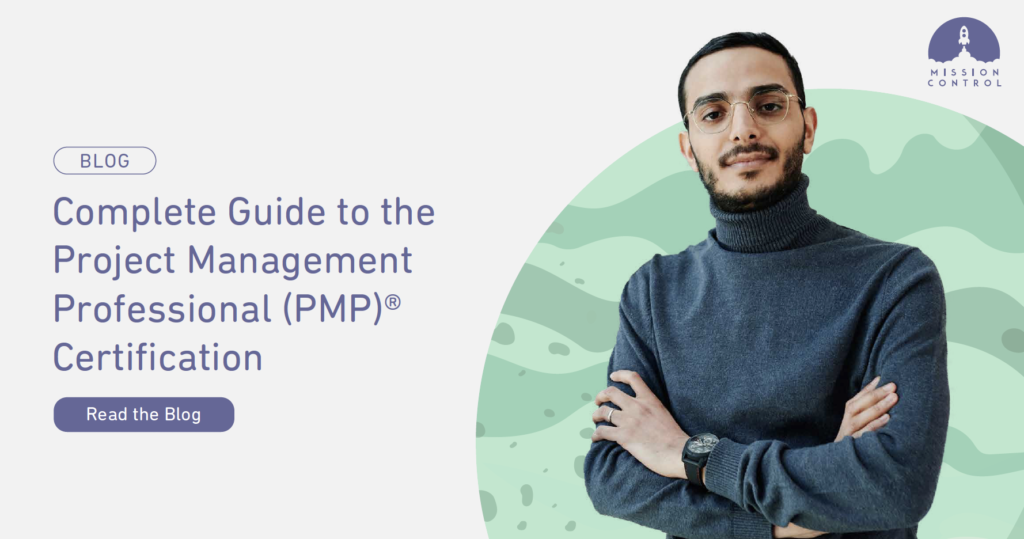Ready to upgrade your project management skills? What you need is a PMP certification. The Project Management Professional certification—better known as PMP—is a popular and well regarded credential in the project management world.
In this guide, we’ll help you understand what PMP certification is, who should apply, how to get certified, and available alternatives.
What is the Project Management Professional (PMP)® Certification?
The Project Management Professional (PMP)® certificate is a globally acknowledged project management credential offered by the Project Management Institute (PMI).
This certification aims at testing a professional’s ability to direct project teams and successfully deliver project objectives. The course thus focuses on initiating, planning, executing, monitoring, controlling, and closing a project.
PMP certification can be helpful to project managers in virtually any industry, including IT, software development, construction, health, business, and more.
PMI designed the PMP certification to help enhance a professional’s existing project management skills. It also helps ensure that the professionals get a complete understanding of project management processes and best practices.
What Are the Benefits of Project Management Professional (PMP)® Certification?
As a project manager looking to enhance your skills, taking a PMP certification is the way to go. Here are other benefits you might see with a PMP under your belt.
Get industry recognition
When you go through the PMP course, you learn the entire project management process and best practices. Getting certified is proof that you understand the entire project management process and have the training required of a professional. Your certificate signals your competence in handling an entire project, from initiation to closure.
Learn new skills
The PMP certificate is a comprehensive course that will help you gain extensive knowledge about project management. In addition to learning the PM process and best practices, you’ll engage with other fundamentals like conflict resolution and budgeting. Everything you learn from the course will help bolster your PM skills and make you a better project manager.
Attract higher salaries
Holding a PMP certification comes with high salary perks. As a PMP cert holder, you
can negotiate for higher pay than a project manager without the certification. According to a PMI survey, project managers earn, on average, $123,000 if PMP-certified and $93,000 if not.
More job prospects
Project managers are in high demand, with employers poised to need 87.7 million individuals to take up project management roles by 2027. However, even with such high demand, 80% of these employers seek certified managers to ensure success.
A PMP certification will set you apart from the crowd and increase your chances of getting a high-level job in the global project management industry.
How to Obtain Project Management Professional (PMP)® Certification
Getting PMP-certified is pretty straightforward. Follow this step-by-step guide.
Step 1: Confirm you meet the PMP certification requirements
Before you can take the PMP exam, there are prerequisites you need.
If you hold a four-year degree, you’ll need:
- 35 hours of project management course training
- 36 months of project management experience for anyone holding a four-year degree
If you hold an associate degree or high school diploma, you’ll need the following:
- 35 hours of project management course training
- 60 months of project management experience
Step 2: Apply online to take the PMP certification exam
Create an account on PMI and get started on an application for the PMP exam. Here’s where you’ll share details of the prerequisites you possess. You’ll be required to add information like your educational background and details on the projects you’ve worked on.
Once the institute confirms that you qualify to take the test, your application will be approved, and you can pay the exam fee and schedule a test.
Step 3: Prepare for the exam
Once you’ve scheduled a test, you can start preparing for it. Start by reviewing PMI’s Certification Handbook to understand the certification process. Then go through the PMP coursework. Also, use PMI’s study resources to prepare for the test.
This is the most involved step of getting certified and could take roughly 60 to 120 hours of studying.
Step 4: Take (and pass) the PMP exam
Now it’s time to put your hard work to the test! Once you feel fully prepared, you can take the exam at a testing site near you or online. The exam takes about four hours to complete.
If you don’t pass the first time (it happens!), don’t fret. You can retake the PMP exam up to 3 times a year and still earn your certification.
Step 5: Maintain your certification
Once you get certified, don’t store it and forget about it. The certification will remain valid for three years, and you must spend 60 hours on professional development activities during this period to keep it in good standing.
5 Alternative Certifications to the Project Management Professional (PMP)® Certification
If the PMP certification doesn’t sound like the right fit for you, here are five other credible project management certifications you can consider, from the PMI or otherwise.
1. Certified Associate in Project Management (CAPM)
CAPM is a popular PM certification offered by Project Management Institute. Like PMP, this certification can distinguish you in the job market and enhance your credibility in managing projects. It’s especially a great option for a project manager who is just starting and has little experience in the field.
This certification focuses on understanding the fundamental knowledge, terminology, and processes of effective project management. Your CAPM certificate will be valid for five years and you don’t need any Professional Development Units (PDUs) to renew it.
Prerequisites:
- Have a high school diploma or an associate’s degree
- 23 hours of project management education or 1,500 hours of project experience
2. Certified ScrumMaster (CSM)
If you often use agile methodologies to run your projects, you’ll find the Certified ScrumMaster certification quite helpful. In this course, you’ll learn the Scrum framework and gain an understanding of team roles, events, and artifacts. The Scrum Alliance offers the certification.
Prerequisites:
- General familiarity with Scrum
- Attend an in-person, 16-hour CSM course
3. CompTIA Project+ certification
The CompTIA Project+ certification is ideal for professionals coordinating or managing small-to-medium projects. This certification is even more attractive because it suits beginners with one year of project management experience.
CompTIA builds on the basics of project management by introducing lessons on constraints, tools, documentation, and change management.
CompTIA Project Co offers the certification.
Prerequisites:
- A year’s experience running projects
- Ability to manage resources and stakeholders
- Communication skills
- Project documentation
4. Certified Project Management Practitioner (CPMP)
Certified Project Management Practitioner (CPMP) is an ideal course for anyone who wants hands-on project management experience. It’s especially an excellent choice for project managers who wish to learn about various project management tools and techniques.
Prerequisites:
There are no prerequisites, but it’s recommended to attend a three-day preparation course
5. Professional in Project Management (PPM)
The Professional in Project Management (PPM) course is a mid-level certification offered by The Global Association for Quality Management (GAQM). The course provides training on planning, executing, controlling, and completing projects. Other modules include developing project schedules, measures, and different approaches to leading and managing projects.
PPM aims to turn you from a basic leader to a manager who can mitigate risks, handle crises, and motivate teams to perform at their best.
Prerequisites
- Complete an e-course
- Have at least some project management experience
Get Started
The PMP certification can potentially grow your career as a project management professional. With this certification, you can stand out from the competition, get better jobs and earn more money. So go on, and kick-start your journey to achieve your PMP certification today.
And if you’re keen to take your PMP to the next level feel free to browse, demo or trial one of the world’s fastest growing project management platforms, Mission Control. Request a demo today.




